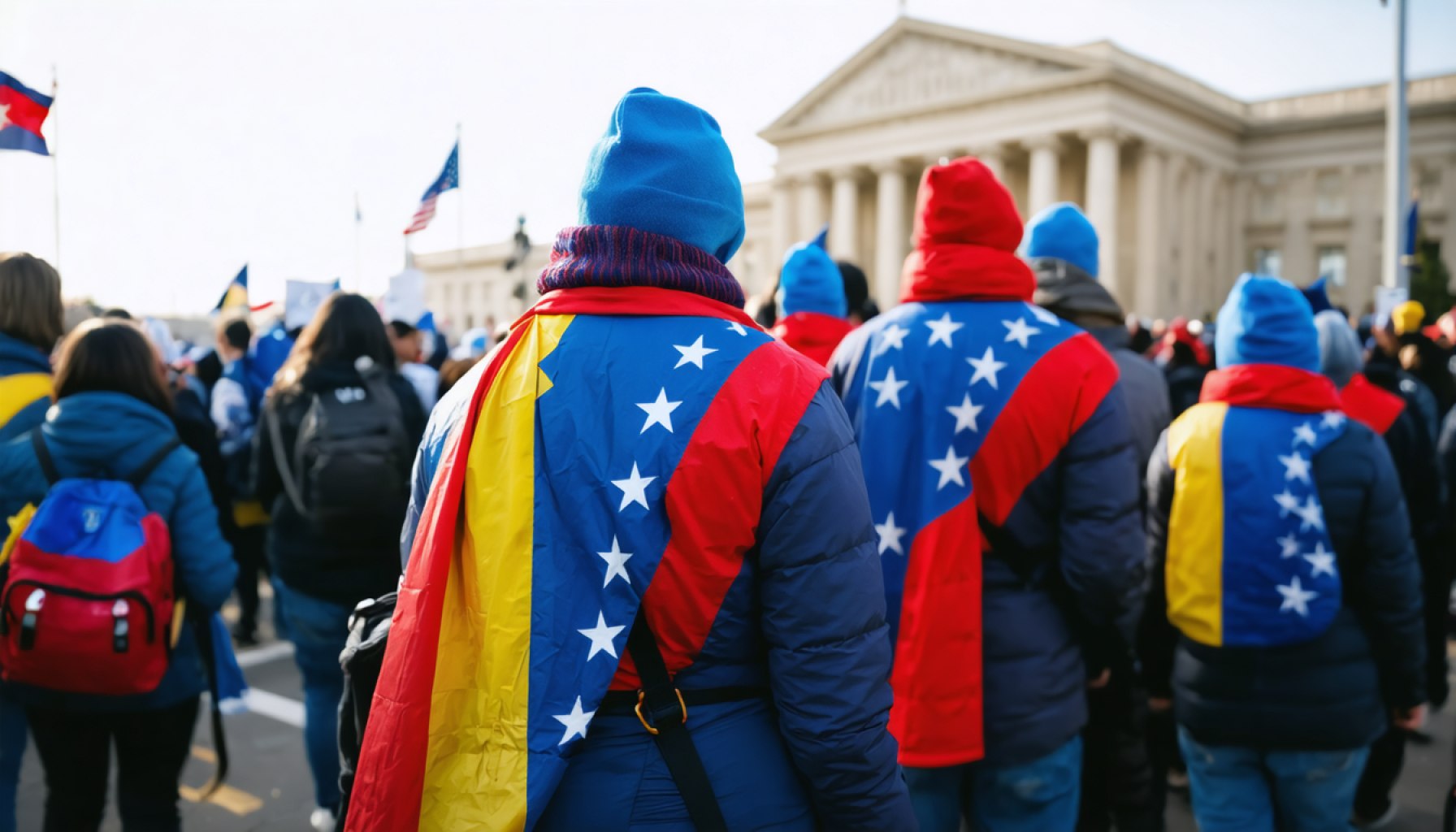- Two lawsuits aim to protect nearly 600,000 Venezuelans from deportation as their Temporary Protected Status (TPS) is at risk of ending.
- Immigrant advocacy groups, CASA and Make the Road New York, argue that ending TPS violates constitutional rights and discriminate against Venezuelans.
- The legal challenge arises amid the humanitarian crisis in Venezuela, where deportees face severe hardship.
- Seven Venezuelans, alongside the National TPS Alliance in California, join the legal battle, alleging racial bias in the termination of TPS.
- Crucial deadlines in April and September loom, exacerbating anxiety for affected families.
- The outcome of these cases could significantly impact immigrant rights and principles of equality in the U.S.
- The broader implication underscores the importance of opposing policies that threaten immigrant communities’ stability.
The courtroom turns into a battleground where hopes and fears collide as two lawsuits aim to shield nearly 600,000 Venezuelans from the looming threat of deportation. Fueled by a decision to end Temporary Protected Status (TPS), the legal action denounces the move as a racially charged violation, starkly opposing the American principles of shelter and equality.
Immigrant advocacy organizations, CASA and Make the Road New York, wield their arguments in a Maryland courtroom, declaring the revocation of TPS as constitutionally flawed and discriminatory. Their plea is clear: intervention is crucial to prevent vulnerable families from being thrust into chaos and uncertainty. The narrative paints a somber picture of the humanitarian crisis in Venezuela, where returning would mean stepping into the abyss for many who have painstakingly rebuilt their lives on American soil.
In California, the voice of resistance is echoed by seven Venezuelans, partnered with the National TPS Alliance, as they challenge the Department of Homeland Security in San Francisco. Their indignation resonates in the legal papers, which highlight troubling allegations of racial bias underlying the termination of protections.
The stakes skyrocket as the clock ticks towards April and September deadlines—dates marked ominously on the calendars of families bracing for upheaval. As the courts deliberate, the future of these Venezuelans hangs in the balance, with decisions set to reverberate far beyond their community.
Amid this uncertainty, one message emerges loud and clear: the battle isn’t just for the Venezuelans. It’s about drawing a line against policies threatening to dissolve the American tapestry stitched by immigrant dreams. The world watches and waits as legal proceedings unfold, hopeful for a verdict that preserves dignity and justice for all who seek refuge from despair.
The High-Stakes Battle Over TPS for Venezuelans: What It Means and What’s Next
How-To Steps & Life Hacks
1. Understand Your Rights: Venezuelans and other immigrants under the Temporary Protected Status (TPS) should stay informed about their legal rights. Non-profit organizations like CASA and Make the Road New York provide resources and support.
2. Stay Updated on Legal Proceedings: Keep track of court rulings and deadlines to ensure compliance with legal requirements and to prepare for any changes. Websites like USCIS offer valuable updates.
3. Consult with an Immigration Attorney: Secure expert immigration advice to navigate complex legal challenges. This can be particularly beneficial for those facing deadlines or possible deportation.
4. Prepare Documentation: Collect and organize documentation supporting your residency, identity, and any other information relevant to the TPS status to streamline legal processes or appeals.
Real-World Use Cases
– Case Study: Family Unity: Many Venezuelans have established families and careers in the United States. TPS allows them to legally stay and work, avoiding the family separations that could occur if TPS is revoked.
– Economic Contributions: Immigrants under TPS contribute to local economies through service industries, healthcare, and other sectors. Studies show that these communities enhance economic diversity and growth.
Market Forecasts & Industry Trends
– The legal status of nearly 600,000 Venezuelans could significantly impact various sectors, especially those that rely on immigrant labor. The restaurant, hospitality, and construction industries might face labor shortages without TPS beneficiaries.
– Political Climate Impact: The TPS debate reflects broader immigration policy trends, potentially influencing upcoming elections and policy reforms over the next decade.
Controversies & Limitations
– Allegations of Racial Bias: Plaintiffs argue that the TPS termination reflects discriminatory political motives rather than objective policy decision-making in immigration law.
– Legal Challenges: The ongoing litigations face criticism on both sides, with opponents arguing that extended TPS undermines immigration law.
Security & Sustainability
– Community Safety: Advocacy groups argue that removing TPS could destabilize communities, increasing the risk of illegal status and undermining community safety and cohesion.
– Sustainability Concerns: The return of Venezuelans to a nation grappling with political and economic instability could exacerbate their already precarious situations.
Pros & Cons Overview
Pros:
– Temporary Safety: Provides immediate legal status, work authorization, and protection from deportation.
– Economic Contributions: TPS beneficiaries contribute significantly to the U.S. economy and local communities.
Cons:
– Uncertainty: TPS is not a path to permanent residency, creating uncertainty for beneficiaries.
– Legal Complications: The ongoing litigation and potential changes in policy make long-term planning difficult.
Actionable Recommendations
1. Engage With Advocacy. Support organizations working for immigrant rights. They provide vital resources and can assist in amplifying the voices of TPS recipients.
2. Raise Awareness. Share credible information about the benefits and importance of TPS. Social media can be a powerful tool in shaping public opinion.
3. Policy Involvement: Contact local and national representatives to express support for policies protecting immigrants.
For more information on immigration laws, visit the USCIS website. Stay informed, stay prepared, and participate in advocacy to defend the rights of all immigrants facing uncertain futures.
